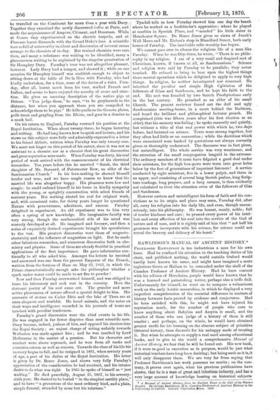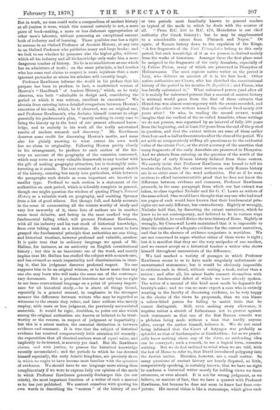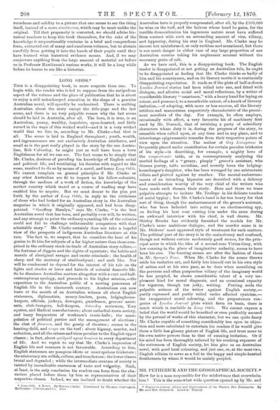RAWLINSON'S MANUAL OF ANCIENT HISTORY.* PROFESSOR RAWLINSON is too industrious
a man for his own fame. Had he confined his attention to the teaching duties of his chair, and published nothing, the world outside Oxford would hardly have known his name, and might have imagined a mute inglorious Grote or Hallam to be concealed under the shell of the Camden Professor of Ancient History. Had he been content with his edition of Herodotus, people would have known that he was a learned and painstaking writer, perhaps also a trifle dull. Unfortunately for himself, he went on to compose a voluminous work on the early Asiatic monarchies, in which he displayed a very imperfect comprehension of the essential difference in matters of history between facts proved by evidence and conjectures. Had he been satisfied with this, he might not have injured his reputation much, for the number of people who care to know anything 'about Babylon and Assyria is small, and the number of those who can judge of a history of them is still smaller ; and perhaps, on the whole, he would have obtained greater credit for his learning on the obscure subject of primitive Oriental history, than discredit for his unhappy mode of treating it. But when he attempts to supply a real need among educational books, and to give to the world a comprehensive Manual of. Ancient History, we fear that he will be found out. His new book, if it were as good in execution as in purpose, would be just what historical teachers have long been desiring; but being such as it is, it will only disappoint them. We are very far from saying that Professor Rawlinson's last work possesses no merits ; on the con- trary, it proves over again, what his previous publications have shown, that he is a man of great and laborious industry, and has a very large amount of knowledge bearing on historical subjects • A Manual of Ancient History, from the Earliest Times to the Fall of the Western Empire. By George Rawlinson, M.A., Camden Professor of Ancient History in the University of Oxford. Oxford: Clarendon press. 1869.
But in truth, no man could write a compendium of ancient history at all (unless it were, which this manual certainly is not, a mere piece of book-making, a more or less dishonest appropriation of other men's labours), without possessing an exceptional amount both of industry and of learning. Those qualities one has a right to assume in an Oxford Professor of Ancient History, at any rate in an Oxford Professor who publishes many and large books; and we look to see whether he possesses also the higher gifts, without which all his industry and all his knowledge only make him a more dangerous teacher of history. No lie is so mischievous as one which has an admixture of truth ; on the same principle, a bad teacher who has some real claims to respect is more injurious than a mere ignorant pretender at whom his scholars will covertly laugh.
Professor Rawlinson informs the world in his preface that his purpose has been to produce, in fact, a modernized version of Heeren's " Handbuch " of Ancient History," which, as he truly observes, was both " admirable in design and, considering the period at which it was written, excellent in execution." We abstain from entering into a detailed comparison between Heeren's execution of his task, which, be it observed, was an original one, and Professor Rawlinson's, who declares himself content to adopt generally his predecessor's plan, " merely seeking in every case to bring the history up to the level of our present advanced know- ledge, and to embody in his work all the really ascertained results of modern research and discovery." Mr. Rawlinson deserves some credit for discerning Heeren's merits, and some also for plainly avowing to what extent his own work has no claim to originality. Following Heeren pretty closely in his arrangement, he prefixes to each section of the his- tory an account of the geography of the countries concerned, which may serve as a very valuable framework to any teacher with the gift of making geography attractive, but is thoroughly unin- teresting as it stands. The text consists of a very general sketch of the history, entering but rarely into particulars, while between the paragraphs such details as seem important are inserted in smaller type. Prefixed to each section is a statement of the authorities on each period, which-is tolerably complete in general, though one might question the wisdom of quoting Pliny's Natural History as a valuable work on geography, and omitting Spruner from a list of good atlases. But though full, and fairly accurate in the sense of enumerating all the writers worthy of study and very few unworthy of it, these lists of authors are in another sense most delusive, and betray in the most marked way the fundamental failing which will prevent Professor Rawlinsou, with all his industry and his vast stock of historical knowledge, from ever taking rank as a historian. He seems never to have grasped the fundamental principle that authorities are one thing, and historical treatises, however profound and valuable, another. It is quite true that in ordinary language we speak of Mr. Hallam, for instance, as an authority on English constitutional history ; but this is an inaccurate use of the word, and merely implies that Mr. Hallam has studied the subject with so much care, and has evinced so much impartiality and discrimination in treat- ing it, that his judgment deserves profound respect. No one supposes him to be an original witness, or to know more than any one else may learn who will make the same use of the contempo- rary documents. But a professed historian not only has no right to use loose conventional language on a point of primary import- ance for all historical study,—he is above all things bound, especially in a general manual, to emphasize in the strongest manner the difference between writers who may be regarded as witnesses to the events they relate, and later authors who merely employ, with more or less judgment, the previously accumulated materials. It would be right, doubtless, to point out also which among the original authorities are known or believed to be trust- worthy or the reverse, in respect of judgment or impartiality ; but this is a minor matter, the essential distinction is between evidence and comment. It is true that the subject of historical evidence has received comparatively little attention till recently ; the superstition that all classical authors were of equal value, and implicitly to be trusted, is scarcely yet dead. But Mr. Rawlinson claims, and with justice, to possess the historical knowledge recently accumulated ; and the periods to which he has devoted himself especially, the early Asiatic kingdoms, are precisely those in which he ought to have become most familiar with the question of evidences. We should have to use language more strong than complimentary if we were to express fully our opinion of the mode in which Professor Rawlinson generally discharges this (to our minds), the most important function of a writer of such a manual as he has just published. We content ourselves with quoting his own words in describing the "sources " of the history of one
or two periods most familiarly known to general readers as typical of the mode in which he deals with the sources of
all. From B.C. 500 to B.C. 479, Herodotua is our chief authority (for Greek history) ; but he may be supplemented to a considerable extent from Plutarch and Nepos." Or again, of Roman history down to the expulsion of the Kings, "A few fragments of the Asti Triunaphales belong to this early period, but such knowledge of it as we possess is derived mainly from the works of historians. Amongst these the first place must be assigned to the fragments of the early Annalists, especially of Q. Fabius Pictor, many of which are preserved in Dionysius of Halicarnassus. The most copious native writer on the period is Livy, who delivers an account of it in his first book. Other native authorities are Cicero, who has sketched the constitutional history of the period in his treatise Dc Republica ; and Florus, who has briefly epitomized it." What unlearned person (and after all it is mainly for unlearned persons that a manual of ancient history is written) would guess from the first of these extracts that Herodotus was almost contemporary with the events recorded, and that of the other two writers named the earliest lived nearly 500 years after? Or who, in reading the second extract, would imagine that the earliest of the so-called Annalists, whose writings we do not possess, was separated by an interval of fully 500 years from the beginning, and at least 230 years from the end of the period in question, and that the extant writers are none of them earlier than four-and-a-half or five cen Curies of ter the close of the period. We set aside as comparatively trifling all questions as to the evidential value of the extant raga, or the strict accuracy of the assertion that many fragments of the early Annalists are preserved in Dionysius. And we abstain from entering on the question of the worth of the knowledge of early Roman history deduced from these sources. 1Ve merely insist that Professor Rawlinson was bound to tell his readers the facts, that the extant writers on early Roman history are in no strict sense of the word authorities. But as if he were anxious to afford incontrovertible proof that lie does not know the difference between evidence and comment, Professor Rawlinson proceeds, in the same paragraph from which our last extract was taken, to class together Niebuhr and Sir G. C. Lewis as writers of the same school. One would have thought that any one who had read ten pages of each would have known that their fundamental prin- ciples are not only different, but contradictory. Rightly or wrongly, Niebuhr held that, by dissecting the extant narratives, which he knew to be not contemporary, and believed to be in various ways deeply falsified, he could divine the true history of Rome. Rightly or wrongly, Sir Cornewall Lewis maintained that it is impossible to trace the existence of adequate evidence for the current narratives, and that in the absence of evidence conjecture is worthless. We are not concerned to argue whether either of these views is right ; but it is manifest that they are the very antipodes of one another, and we cannot accept as a historical teacher a writer who shows himself throughout unconscious of the difference.
We had marked a variety of passages in which Professor Rawlinson seems to us to have made singularly unfortunate or
unwarranted statements; but it would be obviously impossible to criticize each in detail, without writing a book, rather than a
review ; and after all, his minor faults connect themselves with the one fundamental defect of which we have already spoken. The writer of a manual of this kind must needs be dogmatic for brevity's sake; and we can no more expect a man who is entirely wanting in the faculty of discerning evidence, to be very happy in the choice of the views he propounds, than we can blame a colour-blind person for failing to match tints that he cannot distinguish. Still, even making every allowance, it requires rather a stretch of forbearance not to protest against such statements as that one of the first Roman consuls was a plebeian being made without a hint that hardly anyone alive, except the author himself, believes it. We do not mind being informed that the Court of Astyages was probably as
splendid as that of Sardanapalus or Esarhaddon ; for as we practi- cally know nothing about any of the three, no misleading idea can be conveyed ; such a remark, to use a logical term, connotes nothing. But we do feel inclined to rebel when we are told, with the law of Moses to refer to, that David introduced polygamy into the Jewish nation. Mistakes, however, are a small matter. So many questions of ancient history are keenly disputed, so little,
comparatively speaking, is certainly known, that we have no right to condemn a historical writer merely for holding views we deem erroneous, or even absurd. It is not for wrong judgment, as we believe, on matters of fact, that we have a quarrel with Professor Rawlinson, but because he does not seem to know fact from con- jecture. His mental vision is like a stereoscope, which gives such roundness and solidity to a picture that one seems to see the thing itself, instead of a mere simulacrum, which may be most unlike the original. Till that propensity is corrected, we should advise his- torical teachers to keep this book themselves, for the sake of the knowledge it unquestionably contains in a brief and compendious form, extracted out of many and cumbrous volumes, but to abstain carefully from putting it into the hands of their pupils until they have learned what historical evidence means. And, if we may conjecture anything from the large amount of material set before us in Professor Rawlinson's various works, it will be a long while before he learns to see like a historian.




































 Previous page
Previous page